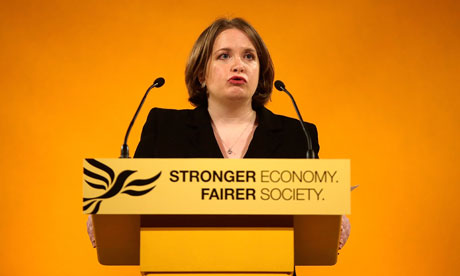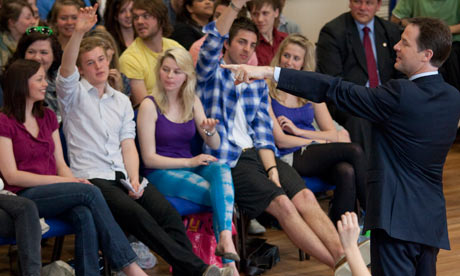Sarah Teather says party is not fighting for justice and describes how immigration policy left her 'desolate'

Sarah Teather says 'something broke' in her when the Lib Dems responded to public concern about the cost of welfare by backing a government cap on benefits. Photograph: Katherine Rose for the Observer
The prominent Liberal Democrat MP Sarah Teather – who shot to fame when she became the youngest member of parliament a decade ago – has announced that she is to quit the House of Commons because she no longer feels that Nick Clegg's party fights sufficiently for social justice and liberal values on immigration.
In a blow to Clegg a week before his party gathers for its annual conference in Glasgow, Teather said his tougher approach to immigration – including a plan for some immigrants to pay a £1,000 deposit when applying for visas – left her feeling so "desolate" and "catastrophically depressed" that she was unable even to confront him over the issue. "It was an absolutely black moment. I couldn't even move from my seat when I read it. I was so depressed I couldn't even be angry. I was utterly desolate," she says.
Announcing her decision to turn her back on frontline politics in an interview with the Observer, she adds that "something broke" in her when the Lib Dems responded to public concern about the cost of welfare by backing a government cap on benefits.
Teather believes the £26,000-a-year limit is a political stunt that will not work, and complains that it will force many of her constituents in the ethnically diverse constituency of Brent Central, in north London, to leave their homes and seek work in cheaper areas where fewer jobs would be available.
"It was the moment of realising that my own party was just as afraid of public opinion as the Labour party," she says. "Something did break for me that was never ever repaired."
While she insists that she still has a lot of respect for Clegg, whom she regards as a "decent bloke", she says that too often he seems to lead a party that no longer appears passionate about the values that attracted her to it as a teenager.
"When I joined the party I had this really strong instinct that it was the party of social justice and liberalism. It was the only party that operated in that space." But now, with the pressure of coalition bearing down on him, Teather, 39, says Clegg and his team react too easily to immediate pressure to appease public opinion. "It is about the reactive pursuit of the latest poll irrespective of what is right and wrong.
"What really gets me is that we remove ourselves from any responsibility for forming public opinion … You achieve change not just through policy but by presenting arguments and having debate and leading debate, and using all the platforms you have in television, parliament, the media. All of those things form and respond to public opinion."
The former charity worker, who served as minister for children in the coalition until 2012, shot to prominence when she won the safe Labour seat of Brent East in September 2003, overturning a 13,047 Labour majority.
While insisting her decade in parliament has been "wonderful" in many ways, she says she no longer feels able to operate within the Liberal Democrat parliamentary party while disagreeing with its approach on fundamental issues. She will remain in parliament until the 2015 general election, and continue as a member of the party, but says she has "no idea" what she will do after that.
Her announcement creates an unfortunate backdrop to the Lib Dem meeting in Glasgow, where the party will try to present itself as distinct from the Tories as it prepares to put together a radical manifesto for 2015. The party faces a series of awkward debates on the economy, tuition fees, green policy and taxation, among other things, as it wrestles with how to present a strikingly distinct policy offering that can still be moderated in potential future coalitions with the Tories or Labour.
The Lib Dems' period in government has coincided with sharp falls not only in the opinion polls but also in party membership and income. The latest figures show it now has a membership of just 42,501. This represents a 35% drop since the height of "Cleggmania" in 2010. The fall in membership fees has also contributed to an operating deficit of £410,000 in the latest annual accounts.
The latest Opinium/Observer poll puts the Lib Dems down percentage point on a fortnight ago, at just 7%. This compares with a vote share of 23% at the 2010 general election and scores of more than 30% in some polls in the runup to polling day. Opinium has Labour on 35% (done one percentage point compared to a fortnight ago), the Tories up one at 30% and Ukip down one on 17%.
Teather says she was dismayed to be told by her party to back the recent motion paving the way for military action in Syria because it was an issue of "loyalty". "If it was a minor aspect of administrative policy then fine – talk to me about loyalty. But if they are wanting to launch military action on another country you can't tell me I need to give permission on the basis of loyalty," she says. She voted no.
A Liberal Democrat spokesman said: "Of course we are disappointed by Sarah's decision.
"The Liberal Democrats have a proud record in government, including cutting taxes for working people by £700 and lifting the poorest paid out of tax altogether; helping businesses create a million jobs; investing billions more in schools to help the poorest children and introducing radical plans for shared parental leave.
"Sarah was a part of this when she served as a minister in the coalition, as well as playing a key role in ending Labour's disgraceful policy of locking up children for immigration purposes."








 221 Comments
221 Comments